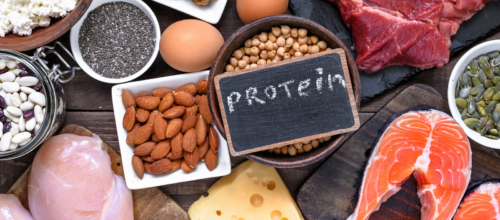
The Importance of Protein in Your Diet
Protein is an essential nutrient for everyone to include in their diet, not just athletes or body builders. Protein is a component of every cell in the body. You use protein to make enzymes, hormones and other body chemicals. It is an important building block of bones, muscles, cartilage, skin, hair, nails and blood. Consuming adequate protein also increases satiety, partly because protein reduces the level of the hunger hormone ghrelin.
Protein has many different functions and is required throughout our entire lifespan. Protein is vital for children to fully grow and develop. As we grow older, protein is important in reducing muscle loss associated with aging. Consuming adequate protein will help maintain muscle strength and function throughout your life, especially when combined with resistance training exercises. Protein is also very important for people who experience injury or illness. Protein breaks down into the amino acids that are needed to repair damaged muscles and promote healing. All of our bodily processes and reactions would not be able to happen without the help of protein.
Protein is composed of amino acids, which are known as “the building blocks of life.” There are 20 amino acids which are broken up into three groups: essential, conditionally essential and nonessential. Essential amino acids cannot be made by the body, so we must consume them in our diet. Conditionally essential amino acids also must be consumed in our diet, but are only necessary under certain conditions such as when the body is under stress. Nonessential amino acids are produced in the body and thus do not need to be consumed in our diet.
Animal protein is considered the best source of essential amino acids. It is referred to as a “complete protein” because it contains all of the essential amino acids our bodies need. If you are a vegetarian, you may need to consume various sources of protein to make sure you are getting all of these essential amino acids. Foods such as quinoa and soybeans are good options because they are also considered complete proteins.
The minimum recommended intake of protein to prevent malnutrition is 0.8 grams of protein per kilogram of body weight. However, this number does not take into consideration other important factors such as age, muscle mass, activity level, total calorie consumption, and current health status. According to the Acceptable Macronutrient Distribution Range, 10-35% of our calories should come from protein.
High protein foods include eggs, almonds, peanuts, chicken breast, oats, cottage cheese, Greek yogurt, milk, broccoli, lean beef, tuna, quinoa, lentil, soybeans, and fish. Protein-containing nutritional supplements can be useful in ensuring protein needs are met if you are not getting adequate amounts from your diet.
Sources:
https://heartmdinstitute.com/diet-nutrition/need-protein-diets/
